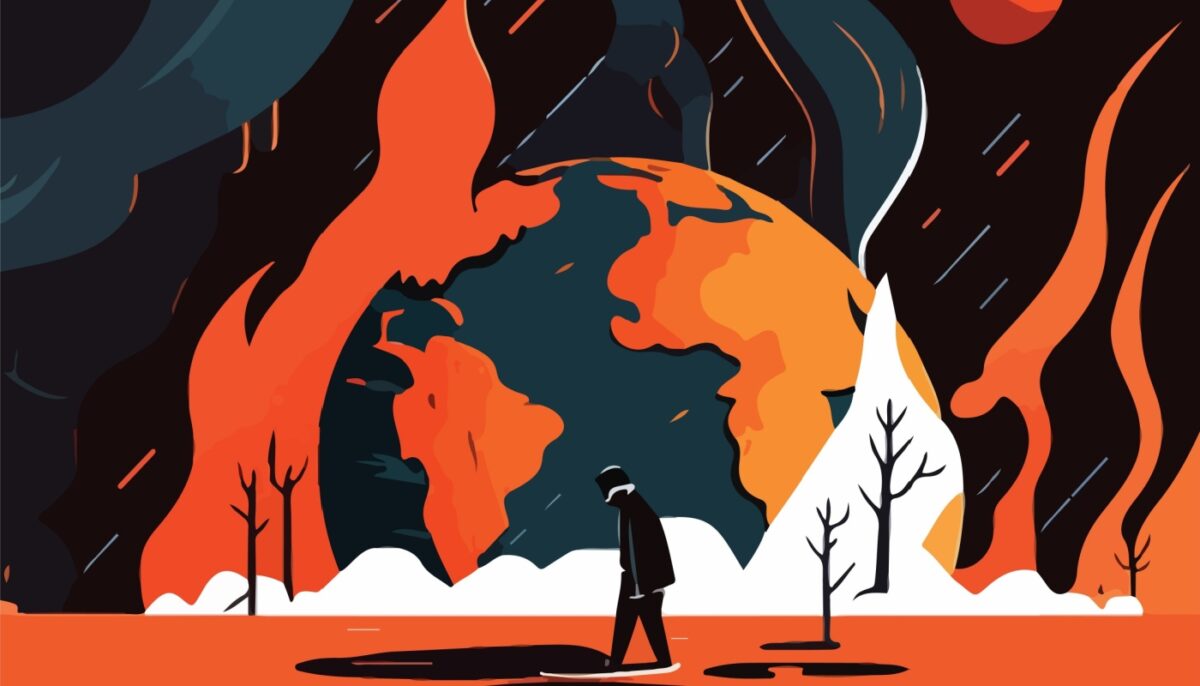 #News
#News
Climate anxiety: pathways yet to be explored by science
Recent studies have attempted to understand the psychological impacts of climate change, especially among young people
 Further studies are needed to shed light on how to prevent or treat mental health disorders related to climate change; some research suggests that activism and taking action against climate change can have a positive impact | Image: Shutterstock
Further studies are needed to shed light on how to prevent or treat mental health disorders related to climate change; some research suggests that activism and taking action against climate change can have a positive impact | Image: Shutterstock
Young Brazilians are some of the most concerned about the effects of climate change. A 2021 survey of 10,000 people aged between 16 and 25 years old in 10 countries found that more than 60% of Brazilians say they are “very or extremely worried” about the issue. About half believe climate change negatively affects their daily lives.
The study, conducted by researchers based in the UK, Finland, and USA, is just one in a wave of studies that has been examining the effects of climate change on mental health.
According to a report published in the journal Nature in April, climate change is having a negative impact on mental health. Almost a billion people are already affected by mental illness, which is one of the biggest health issues facing the world today.
Scientists have identified several ways that the consequences of global warming affect mental health, from trauma caused by hurricanes, floods, droughts, and wildfires to the phenomenon of ecoanxiety (chronic worrying about environmental damage).
Although further studies are needed on how to help people prevent or deal with these problems, some research suggests that activism and taking action against climate change can be an effective method.
Studies indicate that the most commonly afflicted tend to be those who suffer most from climate injustice—groups that are and will be more affected by climate change.
In addition to the young, other frequently affected people include those already living in poverty or experiencing inequality, and people who already suffer from mental health disorders. “Climate change exacerbates existing economic situations, where it's the poorer people who are feeling even worse,” climate researcher and activist Jennifer Uchendu, founder of an environmental group based in Lagos, Nigeria, told Nature.
This new field of research is examining how awareness of climate change and its impacts can cause people to feel worry and stress (or “ecostress”), which has been given various names, including ecoanxiety, climate grief, and solastalgia—described by Australian philosopher Glenn Albrecht as the feeling that “your endemic sense of place is being violated.” Solastalgia is the feeling of missing home, despite not having left.
Global phenomenon
In a 2018 survey, 72% of people aged 18 to 34 responded that negative news about the environment affects their emotional well-being, causing anxiety, racing thoughts, and trouble sleeping.
Another study, carried out during the pandemic in 2020 and published in The Lancet Planetary Health in 2022, indicated that people aged between 16 and 24 years old felt more stress due to climate change than due to COVID-19.

These eco-emotions have previously been dismissed as a concern solely for people in developed nations. But studies like the one cited at the beginning of this article, which found that Brazilians are among the most concerned about the climate, have challenged this perspective.
Of all respondents from the 10 countries in the survey, more than 45% stated that climate change had an impact on their diet, work, sleep, or other aspects of their daily life.
The most likely to report that it impacted their ability to function normally were people from the Philippines, India, and Nigeria, and the least likely were the USA and the UK, contrary to the idea that such concerns are exclusive to residents of rich countries (see graph).
Treatment options
Scientists emphasize that understanding and treating mental health problems exacerbated by the climate crisis will be an immense challenge in a world where mental healthcare is already subpar.
In low- and middle-income countries, only around 3% of people with depression receive adequate treatment, while in rich countries the figure is 23%. At the same time, many communities are finding their own ways to overcome these obstacles, but the effectiveness of their efforts is little studied and shared.
Some evidence suggests that taking action to address the impacts of climate change can help people deal with eco-anxiety. Another recommendation is to limit the amount of time spent reading negative news about the subject.
Researchers are also starting to take collective action. One of the most ambitious research projects on mental health related to climate change, Connecting Climate Minds, released a series of research and action priorities, such as understanding how climate change is linked to the stress caused by war, violence, and epidemics in sub-Saharan Africa.
The project includes researchers, policymakers, and individuals who are experiencing climate change firsthand. Uchendu, one of the scientists interviewed by Nature, says that one of these individuals recently joined an online meeting held by the group. The room he was calling from had been flooded.
*
This article may be republished online under the CC-BY-NC-ND Creative Commons license.
The text must not be edited and the author(s) and source (Science Arena) must be credited.


